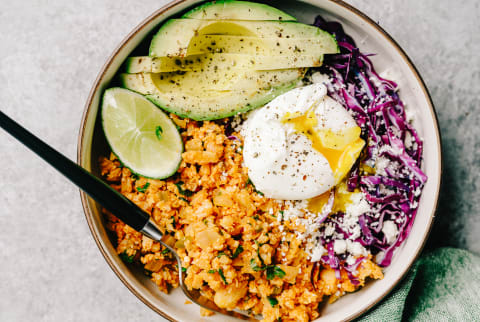Advertisement
5 Reasons You're Not Seeing Results On The Keto Diet & How To Fix Them


Ketogenic diets (lovingly called "keto" by diet devotees) get results…until they don't.
Made popular by the weight loss benefits1, the results don't lie. Studies have shown that during the first three to six months, people on low-carbohydrate diets, like keto, people lose more weight compared to on standard diets1 (read: higher-carbohydrate).
To get those benefits and stay in ketosis, you need to dial down your carbohydrates, way down, moderate protein intake, and step up your dietary fat. This shifts your body to using ketones as fuel rather than carbohydrates.
Many of my patients feel better on ketogenic diets once their body adapts to using ketones. They have better mental clarity, more energy, and they lose weight. But, eventually, many people hit a wall. They stop losing weight, their energy levels crash, and eating another piece of bacon or an omelet feels like agony. If this sounds familiar, not to worry. I've broken down the top five reasons you might not be seeing results anymore and what to do about it.
5 reasons you aren't seeing results on keto.
As with any diet, after the initial weight loss, you may find you hit a frustrating keto plateau. You're feeling great, you're past the keto flu phase, and then bam—the scale stops moving.
As a medical doctor who focuses on gut health, this is where I step in to help. For many patients, I've found there are five common obstacles that stall their success on keto diets. Here's how to solve them:
You're eating too many carbs or protein and not enough fat.
On ketogenic diets, you dramatically reduce carbohydrates to less than 50 grams a day. You'll also decrease protein intake. In other words, going keto is incredibly high in dietary fat: Around 70%1, in fact. If you're not meeting your fat quota, your body can't maintain ketosis. And if you aren't in ketosis, you won't reap keto benefits.
Solution: Become mindful of sneaky carbohydrate sources and, to a lesser degree, protein, both of which can knock you out of ketosis. Add more fat from healthy sources like extra-virgin coconut and olive oils, avocado, nuts, and seeds.
You're noshing on unhealthy "keto-friendly" foods.
There are a lot of "keto" versions of cookies, bread, and other high-carbohydrate foods. Some of them have artificial sweeteners and other foods that you may be sensitive to.
Solution: Eliminate these foods for a month, and see if you start getting results. Focus instead on whole, unprocessed keto-approved foods.
You're not paying attention to gut health.
Many keto plans are low in fiber and other gut-supporting nutrients. Over time, these deficiencies adversely affect the gut microbiome2, increasing inflammation and creating dysbiosis or gut imbalances, as well as backing up your system. Constipation leads to toxin overload, which increases body inflammation and stalls your weight loss efforts.
Solution: A well-designed keto diet is also gut-friendly. It includes fiber-rich foods, including low-sugar fruits like avocado, nuts, and seeds, as well as leafy greens and cruciferous vegetables. To optimize gut health, you'll also want to increase fermented and cultured foods, including kimchi and sauerkraut.
You're bored.
Over time, your body can go into autopilot on a keto diet. Or you get sick of eating bacon and other keto-approved foods. As a result, your weight can stall and you stop seeing results. Boredom can mean you're tempted to eat non-keto foods.
Solution: Mix things up a bit by adding carbohydrates. With a cyclical ketogenic diet1, you alternate periods of higher-carbohydrate days with higher-fat days. You might "cycle" ketogenic five days with two higher-carbohydrate days. Alternately, consider a targeted ketogenic diet, where you eat more carbohydrates around your workout.
You eat too many inflammatory foods.
Some "keto-friendly" foods like grain-fed meats, vegetable oils, and cheese are highly inflammatory. Inflammation takes a hit on your gut, and it drives nearly every disease3 on the planet including obesity.
Solution: Increase anti-inflammatory foods. Make an oil change with extra-virgin olive and coconut oils. Choose grass-fed beef, wild-caught cold-water seafood, wild meats, free-range poultry, and pasture-raised organic eggs. Eat walnuts, which are one of my favorite snacks because they contain anti-inflammatory fatty acids. You can also add freshly or pre-ground flax or chia seeds into your smoothies.
In addition to the tips above, I've found that keeping a food journal can help you pinpoint and eliminate these and other roadblocks that occur on keto diets. Remember, too, that no one diet works for everyone, and that definitely includes keto. Eating this way takes serious commitment, and it's not for everyone.

Vincent M. Pedre, M.D., medical director of Pedre Integrative Health and president of Dr. Pedre Wellness, is a board-certified internist in private practice in New York City since 2004. He completed his bachelor’s degree in Biology at Cornell University before attending the University of Miami School of Medicine and completed his residency in Internal Medicine at the Mount Sinai School of Medicine. He has appeared on the Martha Stewart Show and ABC and is the author of Happy Gut: The Cleansing Program to Help You Lose Weight, Gain Energy, and Eliminate Pain. Dr. Pedre is a clinical instructor in medicine at the Mount Sinai School of Medicine and is certified in yoga and medical acupuncture.
More from the author:
Functional Nutrition Training
Check out Functional Nutrition Coaching
A cutting-edge nutrition deep dive taught by 20+ top health & wellness experts
Learn moreMore from the author:
Functional Nutrition Training
Check out Functional Nutrition Coaching
A cutting-edge nutrition deep dive taught by 20+ top health & wellness experts
Learn more
Vincent M. Pedre, M.D., medical director of Pedre Integrative Health and president of Dr. Pedre Wellness, is a board-certified internist in private practice in New York City since 2004. He completed his bachelor’s degree in Biology at Cornell University before attending the University of Miami School of Medicine and completed his residency in Internal Medicine at the Mount Sinai School of Medicine. He has appeared on the Martha Stewart Show and ABC and is the author of Happy Gut: The Cleansing Program to Help You Lose Weight, Gain Energy, and Eliminate Pain. Dr. Pedre is a clinical instructor in medicine at the Mount Sinai School of Medicine and is certified in yoga and medical acupuncture.


















